#is probably 刺刀 :///
Explore tagged Tumblr posts
Text
10/16/2024 updates:
So study activities I've been doing lately are: glossika sentences, and listening to chinese audiobooks and ausiodramas.
With the goal of hopefully increasing common words I know in Japanese to 3000-5000 (I'm nit sure how many words glossika japanese has... it claims 5000 words and 6400 sentences so hopefully I'll see close to 5000 words, I already knew around 2000 words so I am hoping another few thousand will help my comprehension of shows and stuff). And for Chinese, with the goal of increasing my listening comprehension (which to be honest is going to just take many hours... I expect a few hundred or more. I have the vocabulary from reading, I just need to turn it into vocabulary I can quickly-recall-and-understand when listening).
Optional activities: trying Comprehensible Input type lessons, and seeing how that goes. As usual, I did not stick to my plan lol. I planned to focus on Japanese Comprehensible Input, which would be a better test of the improvements I can make using such lessons. Instead I found myself focusing on Chinese Comprehensible Input Lessons.
Notes:
Glossika japanese course: I've studied 79 hours with between 1-4 hours a week, pitifully small. I was aiming for 1-2 hours a day but lol I'm going to need to step it up to get closer to that. The thing too is? Audio flashcards of english/japanese sentences like glossika are some of the EASIEST study resources to do while multitasking and walking, cleaning, playing video games, working, driving, etc. So I should definitely be able to push the study time to 2 hours just by pressing play when work starts and playing glossika's audio when I'm not doing something focus intensive. Anyway... I need to put more time in. I've gone through 3818 sentences, 26550 reps, and I'd say a vast majority of the words so far have been words I knew. Real rough estimate that only 500-1000 words were new to me, and even of those I've probably seen them im video games before or looked them up while playing a game or readong before. Very daily life vocabulary and sentence types.
Sareta (done? Was done? Have done? And saremashita (was done) are the main words I'm having major trouble grasping the meaning of. I know the word in that I've studied it on purpose for multiple years now, I just don't get what it's conveying. Its a form of suruI think but. Is it conveying "could do" or "done to X by something else" or "happened to X" I'm still quite confused even with the grammar explanations I've read... so I guess off to read even more grammar explanations. Also the masen form of verbs for "you must" instead of you must not. Example: You must go there そこに行かなければなりません。there to (there) ika(go)nakereba(must? Literally If Not)narimasen(not become?)... Go There if not not become -> go there to become (change to correct status accordingly)... it's seems like a double negative with nakerebanarimasen and the double negative confuses me a ton. そこに行かなければならない nakerebanaranai (informal version)
Compare with this example of You must NOT go there: そこへ行ってはいけない soko he (there to) itte (go) wa ikenai (don't go - just the verb conjugated for not doing it). I hipe with enough repetition I'll eventually get this...
Chinese audios: hahahaha.... in my defense, October is my rest month of little work. I listened to 5 hours so far this week. Some bl audiobook on bilibili I was recommended, crime of course so I could follow plot okay (it has good music), SCI mystery beginning a bit, Alice in Wonderland read by a girl on youtube (which I feel really helped as I know every word so it helps me just HEAR better), MoDu first few chapters again, and an audiodrama I started yesterday which had chinese subs... so I was cheating... but with chinese subs I understood everything immediately which was a nice switch up compared to the other practice... its called 提灯看刺刀 and audiodramas are wild in some ways because if you've never read a corresponding book you're still guessing the premise and settings lol but it appeared Han (rich boy police maybe?) and Chu Yi were enemies, Chu Yi was in hospital dying and woke up and Han asked if he ever loved anyone Shen said no and stabbed himself! And I think it's about to be a redo your life plot! I only listened to the intro so far. I need to listen more to their names because I'm still catching those. I recommend it though, its a well made audio drama.
If you ever want a push to immerse in chinese more, make a bilibili account. They have an app and site, its like youtube. And if you, like me, search BL and danmei initially, then it gets to a point where bilibili will recommend you stuff you'll like every time you open the app. I usually see several audiobooks and dramas recommended when I open the app, some crime audiobooks and audio dramas, some dangai animated manhua with the sound effects, some comedy supernatural animated manhua, some newly airing japanese drama BL with chinese subs, and some new reactions to shows that have come out recently that are dangai or danmei. I tend to look up japanese stuff on bilibili too, so I can usually see new bl jdramas and chinese audiobook and audiodramas when I open the app. It makes the question of "what to immerse in" quite simple. If I dont know what to listen to in chinese, I just open bilibili and click something. If Im lazy that day, I pick an animated manhua with audio and the text on screen. If I want just dialogue I click an audiodrama (usually 1-12 hours), and if I want a lot of practice and details of whats going on I click an audiobook.
I am eternally grateful that my brain doesnt seem to discard "skills needed to read" very much at all. No matter if I take a break or not, a few to several hours of trying to read and it comes back. I have a book of Grimms Fairy Tales in Chinese. When I read the Frog Prince, story 1 in the book, it took me 20 minutes despite being 3 pages. When I read story 2 the next day, Red Riding Hood, I could read it at speaking speed and read it aloud because I knew how to pronounce every hanzi again except for the 2 hanzi before the type of wine Red Riding Hood brought for grandma, and the hanzi for door latch 闩 (shuan1). I knew it meant door latch from context but I'd never seen or heard it before so I've just looked up the pronunciation now. So reading took 2 days to come back, and I can read audiodrama chinese subs at speaking speed fine again. I'm super grateful for many reasons, just one being that having this locked in memory of hanzi meanings and a decent amount of their pronunciations (at least enough to attach to the sound radical to help sound out words), means when I do jump back into reading I get all that back quickly. It was hard to initially study hanzi so I am glad the knowledge doesnt deteriorate. It would suck to forget 1000+ hanzi if you take too long a break. I do forget a few hundred hanzi, temporarily, if they were hanzi I was learning in reading but stopped reading before I solidified them in memory, but the knowledge of them comes back and keeps solidifying at the stage it was before once I do read again. The process for Chinese reading skill has been quite similar to french reading skill - barely deteriorating and the skill comes back upon reading again for several hours. I'd say if anything, the listeming study in combo with reading really helps me remember words. I remember better with sound, I think. So mentally if I can't sound out vaguely familiar words I get slowed down when reading. It'll bug me too much that I cant remember the pronunciation. I can read fast enough to have no internal voice, but with words I know it goes much smoother if I know the words pronunciation and not just its visual (I learned a heap of words visual only no pronunciation when I started reading a lot). I connected sound to hanzi very heavily, the sound component in many hanzi helps me a Ton its like im sounding out words in english as well as looking at other component clues for meaning (again - like in english, i look for context in chinese sentences to guess new stuff). When listening only, i find I cant picture the hanzi though... only pinyin if i want to look a word up, or if i know the word i hear then i dont visualize anything I just Understand and move on.
The extra stuff:
I am watching Doraemon in japanese on youtube. I only watched 1 episode, very understandable, I recommend for upper beginners. Doraemon is also in mandarin dub on youtube just search duolaameng, also very beginner friendly.
I watched half of Dont Close Your Eyes Before Its Dark on youtube, a taiwan drama, I could do it without intense focus but the taiwan accent plus low volume of the show meant I only caught the main plot points and missed many little conversation details (in contrast I understand Qi Hun cdrama like 95% of every word). I am watching with no chinese subs.
So I switched to a show called Detention on netflix, also taiwan drama I think, there's a guy student who I think speaks a different dialect or language with his dad because those scenes have built in traditional chinese subs and some words they say sound like words I know while others dont. The girl and her mom and most of the students and faculty speak mandarin, and the guy student does at school. It's a horror, also much less dialogue than Qi Hun cdrama. But it was cool to see I could follow the plot well, it feels like when I watch an english horror show with no subtitles. Audio is clearer and louder in this show Detention than the first one I tried. Also its an interesting show, I recommend. It makes me want to go back and finish watching The Bad Kids, similar vibe in some ways except this is more supernatural. Yes, I love horror. Romantic comedies would be easier practice though, and with more dialogue. Im not watching a xianxia because while I know they talk a lot more (and I miss Ice Fantasy), the voices tend to be clearer in xianxia than in stuff shot like real life. You know what I mean, in Detention and Close Your Eyes people mumble and slur and talk muffled sometimes, same in Qi Hun where Shi Guang talks more like a real person and less clearly. I'd rather practice hearing something closer to how actual conversations sound, since I'm getting very clear spoken audio from audiobooks and audio dramas. I watched 2 episodes of Detention so far.
I watched 1 episode of Inuyasha in japanese. The positive: I followed the plot fine and without intense effort. The negative: I understood only like 20 words total. Theres way more unknown words in Inuyasha for me, compared to Ranma 1/2 (where I know maybe 70% of the words) or Doraemon (where I know 90% or more). So I am not sure if watching would have much benefit. I do understand the episode story beats, so maybe Id pick things up from context? But I know so few words I'm hearing. Also I missed inuyasha, I would love to retwatch. The art is prettier than I remember as a kid. Ranma 1/2 is one of my favorite animes, and I like rumikos other stuff too.
I watched like 10 Lazy Chinese Comprehensible Input videos on youtube yesterday, all on the Intermediate Playlist. I love that channel! I think the intermediate section is amazing. I know every word almost, and she explains particular new words like specific noodle dishes. She shows hanzi if I want to look at the screen and match pronunciation to the words. She speaks slow and clear, but also in an animated cheerful pleasant way so its not boring, and it does feel like being a child a bit and having a pleasant person helping to explain things to you and entertain you with their stories. The clear pronunciation helps me know more clearly what word Im hearing. I can listen to stuff above this level, but I saw someone on reddit mention they listened to the Lazy Chinese channel and then saw a huge listening comprehension boost, and then listened to Tea Time Chinese and got another boost. As I want improved listenimg skill, Im copying them lol. I can understand the Intermediate playlist without looking at the video, so its easier to play in the background. Its also a lot of everyday conversation topics, which is useful to me as novels and shows dont actually cover those mundane topics as much lol. So I think it might help strengthen my foundation of listening skill. I also just think the lessons are amazing for learners in general: lots of repetition, spoken in an entertaining and visually explained way, and even the more advanced stuff is quite understandable and interesting (which is what I used to watch once in a while). If you want to study Chinese with comprehensible input lessons, I 100% recommend going to Lazy Chinese and starting.
I also listened to Alice in Wonderland in chinese read on youtube, as I mentioned above in my study notes. I know most of the words so its more an exercise of practicing quickly recognizing words, with no new word guessing or parsing to slow me down and take up part of my energy like it does with other audiobooks of bigger novels. The reader I found is a girl who speaks softer and higher than Im used to, which I suppose is good practice. But she also reads in a way that reminds me of the way my parents used to read to me, which is comforting in a way, like someone telling you an interesting tale of something that happened somewhere, to entertain you. I listened to Alice in Wonderland maybe 2 years ago in chinese and it was nowhere near this understandable, so my listening skill has gradually improved since then.
I was trying to prioritize watching Comprehensible Japanese youtube channel but. Lol you know me! I avoid often doing what I planned. I watched 6 videos... the absolute beginner videos felt too easy but did have useful vocabulary, the lower intermediate videos explaining comics felt better for my level, but required me to focus enough to feel tired. I could follow the advanced fukushima disaster topic video but that made me feel Very exhausted within a few minutes. I find lets plays of video games I've played before are less exhausting than the Comprehensible Japanese intermediate videos (probably because i know more words from those specific games since I learned some vocab from them), and I find the beginner videos are not exhausting but theyre very boring to me. Thats shy I went looking for a japanese show to watch... something to immerse and pick up words in, that is not boring but not exhausting... not much luck, japanese shows are too hard. They also require intense focus.
3 notes
·
View notes
Text
天潢贵胄 notes
“他也是岭南王唯一的嫡亲儿子!和你一样是天潢贵胄!” [ch 13]
祁骁 (qi2 xiao1), the crown prince
birthday: 腊月初十
18/20 (?) years old
“心中有丘壑” [ch 2]
平日住在宫外的府邸中,十六岁就建府 [ch 5]
海晏殿 (hai3 yan4 palace) 离乾清宫不远
江德清;总管太监
has been serving qi xiao for many years
喜祥 backstory in ch 7
���肃长公主 (grand princess dun1 su4); paternal aunt (嫡亲姑母)
just over 40, older than the emperor by 10 years
祁骁最亲厚的人
身为中宫嫡女
husband: 贺钰春 (he4 yu4 chun1)
3 sons, 2 daughters, first two sons have married & have families, oldest daughter has married last year / is betrothed, youngest son is 9
贺芬华 (he4 fen1 hua2); first daughter
married to 伯安郡王, has 2 sons
样貌好,不是那中看不中用的,有个好招牌,身价水涨船高 [ch 78]
贺芳华 (he4 fang1 hua2); second daughter 14/11 (?) years old this year, soon to reach marriageable age
毓秀殿 (yu4 xiu4 palace),自幼长大的宫阙 ,嫡公主的宫殿
没出嫁前一直住在凤华宫中
“[祁靖]和武帝都是我看着长大的,什么记不得?” [ch 1]
夫家是皇城中的大族,世代簪缨,在朝中很有势力 [ch 6]
宏慈皇后 (empress hong2 ci2); 太宗皇后
文帝; qi xiao’s grandfather
孝钦皇后 (empress xiao4 qin1) / 敬和皇后 (empress jing4 he2); qi xiao’s grandmother
惠老王爷 (hui4); 太宗庶子
文帝最小的弟弟
颇受太宗宠爱,及冠后虽也赐了封地,但一直没让他去封地上,一直在京中住着,没什么实权,但食邑颇丰,在京中很有些名望 [ch 67]
武帝; late emperor (history in ch 4)
当年岭南同皇城联手抗北狄,北狄王暴戾,数犯邻国边境, 武帝同岭南王一起讨伐北狄,这一仗一打就是三年
传闻武帝骁勇善战,且为人睚眦必报,一心要除掉北狄之患
最后一战时武帝中了一箭,大胜后没回到大襄就驾崩
大襄开国以来最善战的皇帝,凭着皇帝登基近二十年,到现在都没能将兵权全部揽过来 [ch 18]
孝贤皇后 (empress xiao4 xian2) / 孝仁皇后 (empress xiao4 ren2); late empress
和敦肃长公主之间亲密和默契 [ch 18]
just turned 20 when she died
冯皇后 (empress feng2) / 成王妃 (princess consort cheng2); the current empress
只有祁骅一个嫡出
皇帝对她敬重有余,宠爱不足
冯氏娘家门第并不高
凤华宫 (feng4 hua2 palace)
善妒 (shan4 du4); empress feng’s older sister
庶子庶女婚嫁之事上没一个有好结果的
冯逸山 (feng2 yi4 shan1); 冯府老太爷
为了给儿子冯国忠让路,早早就告老
冯老太太走的早 [ch 30]
冯国忠 (feng2 guo2 zhong1); 冯皇后的哥哥
方氏 (fang1 shi4); 冯皇后嫂子
冯府二品诰命
younger than empress feng by 5 years, looks 30
德馨长公主 (grand princess de2 xin1)
庶出
祁靖 (qi2 jing4); the emperor
自登基以来休养生息,一力弥补武帝连年征战耗的亏空,这几年国库丰盈了许多
皇帝因生母早逝,襁褓中就被抱到了凤华宫中由中宫皇后亲自养育,那会儿敦肃长公主就待皇帝很好,说句长姐如母也不为过
三岁母妃走得早,敬和皇后可怜他没了娘,就将他抱到了自己宫里同嫡长子武帝一起养着 [ch 93]
married when just turned 16
承乾宫 (cheng2 qian2 palace)
乾清宫 (qian2 qing1 palace) (?) (晚宴)
福海禄 (fu2 hai3 lu4); 乾清宫首领太监
太和殿 (tai4 he2 palace) (?) (大理寺卿)
祁骅 (qi2 hua2); the second prince
“ 是个不中用的 “ [ch 2]
16 years old
前年府上都养着娈宠 [ch 13]
昭阳殿 (zhao1 yang2 palace)
祁骍 (qi2 xing1) / 祁骐 (qi2 qi2); the third prince
前年府上都养着娈宠 [ch 13]
薛贵妃 (noble consort xue1)
母家在朝中也很有势力,年轻,这些年一直很受宠
雍华宫 (yong1 hua2 palace)
祁骊 (qi2 li2); the fourth prince
年满十二 [ch 102]
姜 (jiang1) 贵人
裕隆宫 (yu4 long2 palace)
老五, 水云殿
岭南 (ling3 nan2); 异姓王的封地,历代大襄皇帝的心腹大患 (history in ch 2)
东陵百刃 (bai3 ren4); 岭南世子,质子
15 years old
岭南王府河清阁
许他每���进宫来诲信院 (hui4 xin4) 听讲
东陵奕 (dong1 ling2 yi4); 岭南王
岭南王妃
父亲兄长当年全在瓮溪战死,无娘家可依
柔嘉郡主 (princess rou2 jia1); 百刃的嫡亲姐姐
16 years old
夏氏;岭南王侧妃 / 宠妃
3 sons, 1 daughter
youngest son is 7
东陵文钰 (wen2 yu4); 百刃的庶出弟弟
15 years old
比百刃只小三个月
康泰郡主 (princess kang1 tai4); 庶出
岭南王的掌上明珠
14 years old
岑朝歌 (cen2 zhao1 ge1); 百刃的伴读
岭南文相岑海禄 (cen2 hai3 lu4) 的长子,岑海禄的发妻是岭南王妃的表妹
百刃往外传消息的暗哨
董博儒 (dong3 bo2 ru2); 百刃早逝的外祖留给他的谋士
看着百刃和他姐姐长大
#天潢贵胄#to keep track of info / thoughts#even though i'm only in the first handful of chapters akjdsjkajkask#i got past them not searching up terms and going w/ the flow#now i'm regretti and diligently going back to understand the things#it's quite fun#doing dis also to hold myself accountable hahahhahaha#it's an okay length book but still kinda long#111 chaps + 5 番外 & a word length smaller than zhenhun's by a comfortable margin#i've read too many cnovels and got joy out of them by not taking them seriously#the last novel i properly read and put my srs feelings & thoughts into#is probably 刺刀 :///#nothing since then gave me a proper indulgent experience#partly bc i've been rushing through things in search for the One True Novel#that satisfies my short list of needs#i've decided that i'll give this novel a proper chance!! and i'll follow through as much as i can!!#immersing in the story and feeling out / for the characters properly#instead of just flying through it like wheeee (1) second gratification and then#just#throwing the whole story & characters aside 5ever aksdskajdjka#also the first cnovel that's not 穿越 that i found myself#it 主攻 too /justright#text#me is mark
2 notes
·
View notes
Text
Tea Time🍵
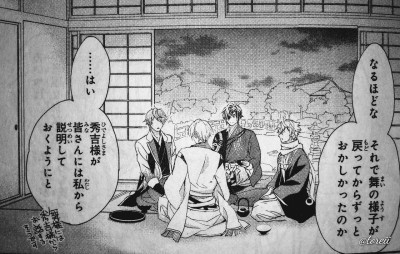
Ieyasu:
なるほどな。それで舞の様子が戻ってからずっとおかしかったのか
“I see. So, it’s been weird ever since Mai returned.”
Mitsunari:
……はい。秀吉様が皆さんには私から説明しておくようにと
舞様には秀吉様からお話するそうです
“...Yes. Hideyoshi-sama asked me to explain it to everyone.
It seems Mai-sama and Hideyoshi-sama are talking right now.”
舞様の足元にすがりついた刺客は確かに懐剣を隠し持っていました
舞様は動揺していて気付いていなかったので…
刺客をあ殺めた信長様の一太刀が一方的な殺戮にみえたのでしょう
“The assassin who clung to Mai-sama’s foot certainly had a concealed dagger. Mai-sama was upset and did not realize it… It looks like Nobunaga-sama’s sword, which killed the assassin, seems to be a one-sided massacre.”
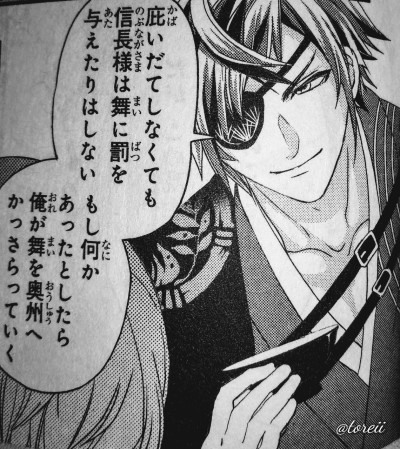
Masamune:
庇いだてしなくても信長様は舞に罰を与えたりはしない
もし何かあったとしたら俺が舞を奧洲へかっさらっていく
“Even if she doesn’t serve him, Nobunaga-sama wouldn’t punish Mai. If anything happens, I’ll take Mai to Oshu.”
Mitsunari:
駄目ですよ政宗様
“Don’t, Masamune-sama.”

Masamune:
三成は舞に囲碁を教えてるんだったか
“Mitsunari, weren’t you teaching Go to Mai?”
Mitsunari:
これからの成長に期待しているんだす
“I’m looking forward to her growth in the future.”
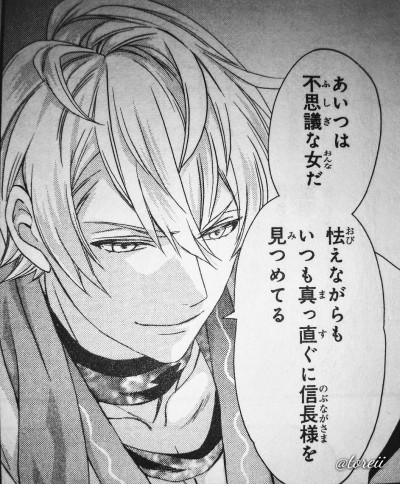
Mitsuhide:
あいつは不思議な女だ
怯えながらもいつも真っ直ぐに信長様を見つめてる
身分の差などまるで気にせず
“She’s a strange woman. Even though she’s afraid, she’s always staring straight at Nobunaga-sama. She doesn’t care about the difference in status.”
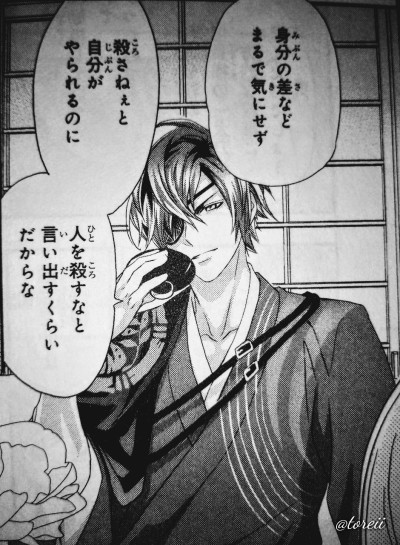
Masamune:
身分の差などまるで気にせず
殺さねえと自分がやられるのに
人を殺すなと言い出すくらいだからな
よほど平和な土地で育ったに違いない
だが この乱世においてそのような国は桃源郷のごとき幻だ
“I don’t care about differences in status, either. If I don’t kill the enemy, I’ll be the one getting killed. Of course, I’m not saying to kill anyone. She probably grew up in a peaceful world. However, in these turbulent times, that seems like an illusion.”

Ieyasu:
まったく… 弱いのかしたたかなのかわからないな
“Seriously… I don’t know if she’s weak or stubborn.”
Masamune:
きになって仕方ないって顔だな家康
“Ieyasu has a hopeless expression.”
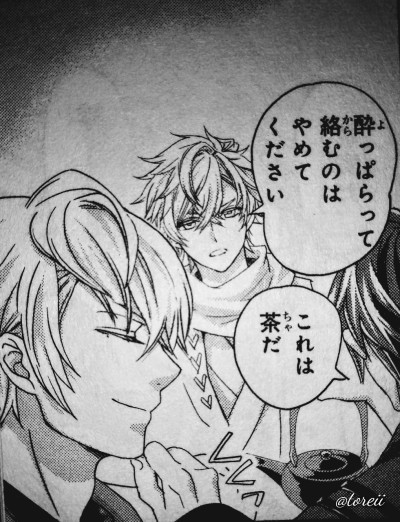
Ieyasu:
え��誰が
酔っぱらって絡むのはやめてください
“Huh...who does? Please stop drunkenly messing around.”
Masamune:
これは茶だ
“This is tea.”
Mitsunari:
光秀さん何がおかしいんですか
“Is something wrong, Mitsuhide-san?”
Mitsuhide:
別に?笑ってなどいないが
“Not really? I’m not laughing.”

Mitsunari:
あれ… 何だかこのお茶……
お酒のにおいがします
“Oh… Somehow this tea… It smells like sake.”
#ikemen sengoku#ikesen#ikesen manga#oda forces#ieyasu tokugawa#mitsunari ishida#masamune date#mitsuhide akechi#my lame edits#translations not 100% accurate#do not repost or reupload elsewhere#never let mitsuhide give you tea#i love how he casually walks away#take responsibility mitsuhide#you cant just leave masamune like that
320 notes
·
View notes
Text
TMM Alien Weapons/Attacks

The names of weapons and attacks in Tokyo Mew Mew have a history of being horribly mistranslated.
Putting aside the Ribbon/Reborn debate and Tokyopop’s inexplicable mangling of English words (Mintoon Alo, Lettuce Flash), the anime subtitles get weird whenever the subbers mishear a word or attempt to guess at which kanji is used without having access to the script. This results in stuff like the Mewberry Rod becoming the New Berry Lot and all the aliens’ attacks being wildly inconsistent.
In general, the aliens’ weapons/attacks follow these rules:
1) Name of the weapon is the name of the main attack. (There can be more attacks with varying names or without names at all, though).
2) Main name/attack is in Japanese rather than English and consists of three kanji.
3) Color scheme is either red/yellow/purple or silver/black/blue/red.
4) Has a symbol involving a circle and some lines/shapes surrounding it. This symbol seems to be unique to the alien and shows up on most chimeras they create.
5) Design is inexplicably based on a human weapon despite no contact with Earth for millions of years.
The fact that the attacks are anime-original and written in kanji was a big problem for subbers with no script to refer to. Sometimes they misheard the attack itself (Kuu Rai Sen was heard as Fuu Rai Sen) and sometimes they heard the correct pronunciation but didn’t know the exact kanji used and guessed at the meaning based on context.

The success of this varied.
Let’s start by looking at Pie, who has the greatest number of attacks and is most consistently mistranslated and mistranscribed.

Pie’s fan is looks like it’s based on an uchiwa, a type of non-folding Japanese paper fan.

His symbol is in the center, and it appears on the Chimera Anima he makes (most of the time...).
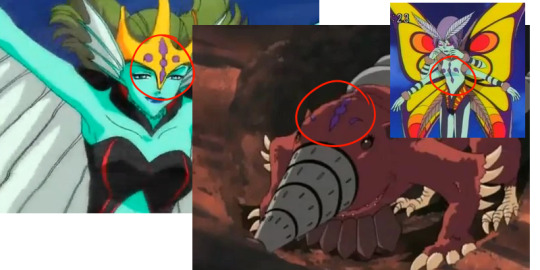
Pie’s main attacks are listed on the Japanese Wikipedia page for TMM.

They are: 空雷扇 (kuu rai sen) and 空雷旋風��� (kuu rai senpuu jin).
The first is the one the subs refer to as “Windy Thunder Fan” because the subbers heard fuu instead of kuu and assumed it used 風 (wind) instead of 空 (sky). The kanji are literally “sky/empty space,” “thunder/lightning,” and “fan,” so I think “Sky Lightning Fan” would probably be more accurate.
The second attack is the misleading one.
It sounds like it adds on puujin to the end of the original attack, but it really replaces the sen meaning fan with a different kanji to make up senpuu (旋風), meaning whirlwind. The last kanji means god, so a literal translation would be something like “Sky Lightning Whirlwind God.” The subs translate this as “Stormy Thunder Tornado Formation” because the subbers assume the kanji is 風雷扇風陣 (lit., wind thunder fan wind battle-formation) instead.
Pie also has a few other attacks, like 風氷扇 (kuu hyou sen) or “Sky Ice Fan” and 風刺扇 (fuu shi sen) or “Sky Cutting/Piercing Fan.”

Tart’s weapon is mainly based on the vintage American toy Clackers, but the way he throws it to capture people is inspired by bolas, an Argentinian weapon.

His symbol is found on each ball and also on most of the Chimera Anima he makes.

Like Pie, Tart has a lightning attack, so you’d assume that the rai in his attack/weapon name would be 雷 for lightning, but it’s actually not.

According to Wikipedia, Tart’s attack is 宝来球 (hou rai kyuu).
The kanji literally mean “treasure,” “come/next/become,” and “sphere.” The second kanji is also used as a verb with the sense of coming to something and, more relevantly, coming back to something, so I think it’s used in the sense of the sphere returning to the same position again and again as it spins. So a very literal (and horribly uncomfortable) translation might be “Treasure Coming Sphere,” but something like “Treasure Returning Sphere” would be better.
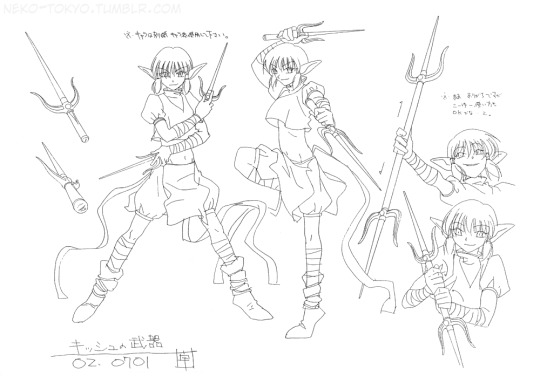
Quiche’s swords are clearly based on sai, which are a traditional Okinawan weapon. Sai aren’t usually pointed, but Quiche uses his like swords and they’re sometimes drawn as having a flat blade rather than a rounded metal spike.
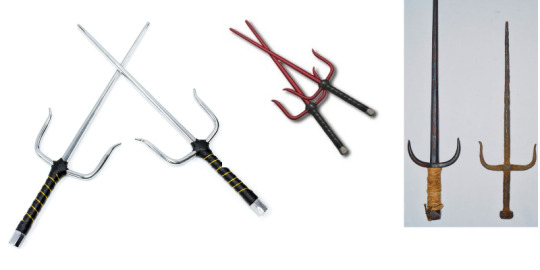
His symbol is a little less obvious than Pie’s or Tart’s. It’s made up of the blue gem, the two black lines on the prongs and the red teardrop shape on the handle.

Quiche doesn’t usually name his attacks, but he says his weapon name while summoning it.

His weapon is called 釵龍刀 (sai ryuu tou), which is literally “sai,” “dragon,” and “single-edged sword.” The subbers translate this as “Dragon Swords,” which is probably fine. You could use something like “Sai Dragon Swords” if you really want to include all the parts or else “Bladed Dragon Sai” if you’re willing to stretch it a little.

This last one is sort of a weird one since it belongs to the Blue Knight and Deep Blue and doesn’t seem to follow the naming rules for the others.
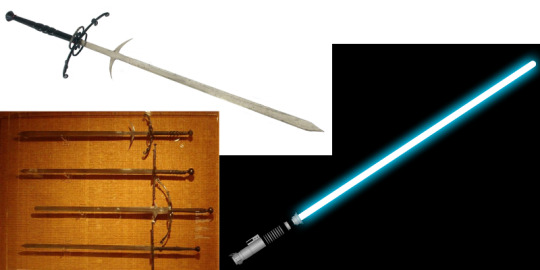
As far as I could tell, the sword is more of a fantasy mishmash of European-style double-edged swords than it is a reference to any one type. The blade looks vaguely like a Zweihander (really long two-handed German sword), but it’s clearly too short. To be honest, the look of the handle and the way the blade comes out reminds me of a lightsaber more than anything else.
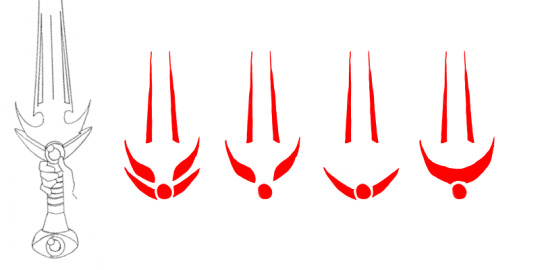
Deep Blue never summons any Chimera Anima, so there’s no way to confirm his symbol (or if he has one). His sword looks vaguely like Quiche’s, so here’s a few possibilities based on that.
The sword itself is never named, and neither the Blue Knight nor Deep Blue have any named attacks.
At least in the anime.
The Blue Knight does have one named attack in the manga: 彗星藍玉斬 (suisei aidama zan). Suisei is “comet” and aidama literally means “indigo gem” but actually refers to aquamarine. Zan means something along the lines of cutting/wounding with a sword. So, “Comet Aquamarine Slash” or “Aquamarine Comet Slash” for more natural English order.
Tokyopop translates it as “Indigo Comet Blade” and Kodansha translates it as “Blue Comet Slash.”
Speaking of the manga, Pie actually uses Kuu Rai Sen once to break a pipe despite 1) not having a fan and 2) all of the aliens including him having used energy blasts like that before without saying anything. I guess it’s more of Ikumi incorporating parts from the anime. Tokyopop calls it “Blade of Thunder,” and Kodansha calls it “Air Thunder Fan.”
There’s also one single panel where it looks like Tart and Pie might have their anime weapons, but it’s hard to tell since they’re so small.

Otherwise, at least Quiche and Tart have very skinny knives, and Quiche fights with tonfa (another traditional Okinawan weapon) instead of sai. BK/DB still has a European-style double-edged sword, but it’s so generic that it’s literally the glowing silhouette of a sword.
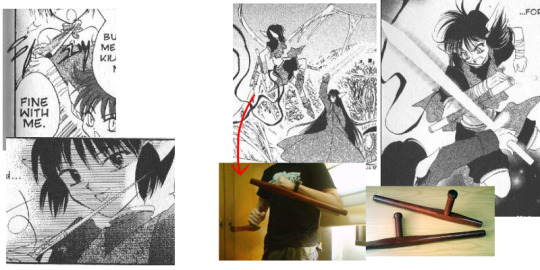
People have been using stuff like “Windy Thunder Fan” for a while and I’d be glad to see them switch to “Sky Lightning Fan” or “Air Thunder Fan” like in the Kodansha manga. But I honestly think that most people tend to use things like “Kuu Rai Sen” (I mean, in that case they might use Fuu, but awareness is growing). This is pretty common for attack/technique names from manga and anime (e.g., jutsu from Naruto) because they sound cool in Japanese and weird when translated literally.
If you’re writing fanfic you could try taking a page from some official translators and prettying up the translation, i.e., keeping the spirit of the original name but making it sound cooler/flow better in English. So, “Sky Lightning Fan” could be “Celestial Lightning Fan” or you could fudge “Coming” or “Returning” into “Revolution.”
Or else you could go the scanlation/subtitle root and rely on on-page translation notes.
One other thing to consider is the fact that it makes no sense for them to actually be speaking Japanese (they’re aliens) so there’s got to be some kind of translation going on in-universe. This means you can justify being really liberal with your translation choices because who’s to say that wasn’t what they actually said before the alien to Japanese translator messed it up? Does the word for sky have the same connotations after millennia underground? What was the word that is translated as “sai”?
Anyway, this is more the subject for another post, so I’ll leave it there...
143 notes
·
View notes
Text
The Epic of Zektbach Website - Nyoah's Note 06
冒険者諸君、ごきげんよう。私の名前はニョア。ジョバンニやカムパネルラとは違う。
Greetings, adventurers. My name is Nyoah. I'm not Giovanni or Kamppanella.
諸君らの世界は突き刺す様な暑い日々が続いていると思うが、元気だろうか? ちなみに、ニョアは暑いところが苦手だ。ロシアンブルー種は毛の密度が濃いのだ。
I'm sure it's been piercingly hot in your world, but how are you?
By the way, Nyoah is not good in hot places. The Russian Blue breed has dense fur.
そんなときはイスファハンの露天で売っている秋刀魚の形と味をしているサーリーアイスが食べたくなる。
In such a case, I would like to eat surly ice cream, which has the shape and taste of an autumn swordfish, sold at a street vendor in Istaphan.
ニョアは猫であるが故、やはり魚は無視できないにゃ。
Since Nyoah is a cat, he can't ignore fish.
そういえば、ニョアとZektbachはどこで食事を取っているかという質問が多く来ていたが 私が川で釣りをして、森林で山菜を摘み、草原では豚を追いかけたりして 現地調達で私が料理を作ってZektbachと一緒に食べる事が多い。
By the way, I've been getting a lot of questions about where Nyoah and Zektbach eat their meals.
I fish in the river, pick wild vegetables in the forest, and chase pigs in the meadow and I cooked locally. I often make and eat it with Zektbach.
たまにZektbachの吟遊による収入があれば、ノヴァリスタの高級料理店で王国メニューを食すこともあるが 基本的にZektbachはお金を持ってないので、自然の恵みに感謝するしかないにゃ。
Occasionally, if Zektbach has the income from his scrutiny, he will eat the kingdom's menu at a fine restaurant in Novarista.
Basically, Zektbach doesn't have any money, so he has to be grateful for nature's bounty.
さて、私の元に次々と届いている伝書鳩にくくりつ��られた便りに目を通していると 先週、大幅に変化したSTORYページが好評のようで記録猫のニョアとしては嬉しいぞ。
Well, I've been looking through the letters that have been delivered to me one after another, attached to the carrier pigeons.
I'm happy to see that the Story page, which underwent a drastic change last week, seems to have been well received.
これからも次々に物語を追加していく予定であるので、楽しみにしていて欲しい。 ちなみに、Zektbachは今リーデンブルグの魔法の杖ワゴンセールに出かけている。
We plan to add more stories one after another, so please look forward to them.
By the way, Zektbach is currently at a magic wand wagon sale in Ridenburg.
私が苦労して食べ物を調達しているのに、要りもしない杖を買いに行くとはのんきなものである…。
He was so carefree that he went to buy a cane he didn't need while I was struggling to get food....
『カルカン ウィスカス』を掲げ叫びました・・・野良猫 らしい猫が大量に現れてウィスカスが数秒で無くなってし まいました (TωT) あの中に ニョアさんはいたのでしょうか? (召喚士ケイマより)
I held up the "Kalkan Whiskas" and shouted... "Stray cats!
The whiskas were gone in a few seconds.(TωT)
I wonder if Nyoah was among them.
(From Keima, the Summoner)
その中で一番高貴な顔をしている猫が私だ。 君達の世界に行くときは、私は色々な猫に変身している。 でも私のこの高貴な顔にかなう猫はそんじょそこらの猫にはいないにゃ!
I am the most noble looking cat of them all.
When I go to your world, I transform into many different cats.
But no cat in the world can match my noble face!
いつか会社でシャムシール様のように踊れるようになるに はどんな練習がありますか? (踊り子庶務シールより)
How do I practice so that one day I can dance like Shamshir at work?
(From the Dancing General Seal)
踊り子であり、庶務であるシールは…って君はなかなか粋な御仁であるな。 そうだな、シャムシールの踊りは、剣術と一体化しているので 戦いを重ねるたびに磨きがかかっていったというのが1つある。 庶務であるならば、上司と折り合いが付かずに口論になったときに ヒラリと踊りながら文句を言うとよいぞ。 もうひとつ。踊りにリズムは必須である。 庶務とあらば、一日中電話もひっきりなしになる事であろう。 電話が鳴る度にそのプルル音の鳴る間隔に合わせてステップを踏むとよいだろう。 さすれば、君も立派な踊り子になれるにゃ! かわりに庶務というジョブを失うかもにゃ…。
As a dancer and a commoner, Shamshir is...well, you're quite a chic fellow, aren't you?
Yes, the Shamshir's dancing is integrated with his swordplay.
One of the reasons is that the Shamshir's dancing is integrated with his swordplay, and it has become more and more refined with each battle.
If you're in general affairs, when you have an argument with your boss and can't come to an agreement with him, you can complain to him while dancing and fluttering.
One more thing. Rhythm is essential for dancing.
If you are in general affairs, you will probably be on the phone all day long.
Whenever the phone rings, it would be a good idea to step in time with the interval between the ringing of the phone.
Then you'll be a great dancer!
You may lose your job of general affairs instead...
ニョアさま、Zektbachさまはどのように1日を過ごしてますか? (騎士アンネより)
How do you spend your day, Mr. Nyoah and Mr. Zektbach?
(From Knight Anne)
各地の街で吟遊しているZektbachなので、私達は常に旅をしている。 川沿いの土手に住んでいる時もあれば、誰もいない古城をねぐらにしている時もある。 Zektbachは昼間は街で吟じているので、その間私は食べ物を調達したり叙事詩の資料をまとめたり 君達から届いた便りを見たり、オスティヌスとチェスをしたり、昼寝をしていたりと忙しいのだ。 夜にZektbachが私の元へ帰ってくるのだが、大抵は吟じて得た金を無駄な物に変えて帰ってくる困った人にゃ。
We are always traveling because Zektbach is wandering around the city.
Sometimes he lives on the banks of the river, other times he roosts in an empty old castle.
Zektbach spends his daytime hours in the city, while I gather food, compile epic poetry, and write letters to you.
During the day, Zektbach is in the city examining, while I am busy getting food, compiling material for the epic, reading the letters that come from you, playing chess with Ostinus, and taking naps.
In the evening, Zektbach comes back to me, but he is usually a troublesome person who turns the money he has earned from gambling into something useless.
では、私はそろそろ今晩のおかずを調達しに行くので… さらばにゃ!
Well, I'd better go and get some more food for tonight...
Farewell!
――――――――――――ニョアの手記 6 ――――――――――――
Nyoah's Note 06
(2008.08.06)
0 notes
Photo
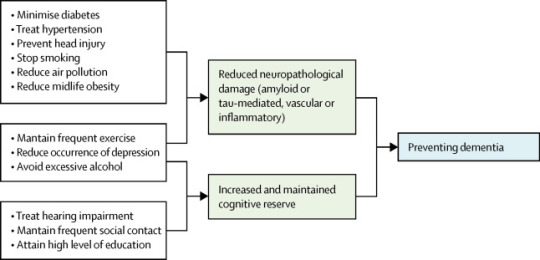


尽早改变这12点,40% 失智症可预防!《柳叶刀》最新报告建议全面防治
在近日召开的 2020 年阿尔茨海默病协会国际会议(AAIC)上,《柳叶刀》委员会发表了最新的失智症预防、干预和护理报告,提出改变12个危险因素可预防或延迟多达 40% 的失智症病例,此外,也就失智症诊疗提供了建议。柳叶刀委员会由 28 位全球领先的失智症专家组成,委员会成员通过对该领域所有最佳证据的全面回顾而得出了这份报告。
报告显示,全球约有 5000 万人患有失智症,预计这一数字到 2050 年将增加到 1.52亿,尤其是在中低收入国家。然而,在部分国家,比如美国、英国和法国,失智症患者的比例正在下降,可能与教育、营养、医疗保健和生活方式的改变有关,这提示通过预防措施是有可能减少失智症的。
委员会主席,南加州大学(University of Southern California)阿尔茨海默病研究中心联合主任 Lon Schneider 博士表示:“避免失智症的策略是,尽早开始并贯穿一生,任何时候采取行动都是值得鼓励的。”
在2017年版报告的基础上,此次报告特别提出了3个新的危险因素:中年过量饮酒、头部受伤,以及晚年暴露于空气污染。
具体而言,报告将可改变的危险因素按年龄阶段分为了生命早年、中年和晚年的预防要点,并列出了可归因于各因素的失智症病例比例。早年(<45岁):教育程度低(7.1%);中年(45-60岁):听力下降(8.2%),脑外伤(3.4%),高血压(1.9%),过量饮酒(0.8%)和肥胖症(0.7%);晚年(>65岁):吸烟(5.2%),抑郁症(3.9%),缺乏社交(3.5%),缺乏运动能力(1.6%),空气污染(2.3%)和糖尿病(1.1%)
其中,早年受教育程度较低、中年失聪和晚年吸烟,是与失智症关联程度最大的几项危险因素。
报告还着重提出9条针对政策制定者和个人的建议,以预防失智症:从40岁起,注意将收缩压维持在 130 mm Hg 以下。减轻听力损失,保护耳朵免受高噪音,在听力障碍者中鼓励使用助听器。减少暴露于空气污染和二手烟。防止头部受伤(特别是针对高风险职业)。限制酒精摄入,每周饮酒不超过 210ml 或 168g 纯酒精。停止吸烟,并支持他人停止吸烟。为所有儿童提供初等和中等教育。保持积极生活,进入中年甚至晚年都是如此。减少肥胖症和糖尿病的相关疾病。
据估计,在全球范围内,上述9种危险因素影响了35%的失智症病例,在中国影响更大,占到所有失智症病例的40%。委员会表示,实际值可能比估计值还更高,而且这还没有算入新增的3个危险因素。
委员会也承认,并非所有的失智症都完全可预防。因此,报告也提供了失智症患者的管理建议,呼吁为失智症患者提供全面、个体化和基于循证证据的干预和护理。
在诊断方面,尽管淀粉样蛋白和tau蛋白的异常沉积是重要病理特点,与认知障碍风险增加有关,但在个体层面目前还难以用在诊断上,很多出现这些生理异常但认知正常的人不会发展成失智症。不过,报告也指出,我们对失智症病因、病理学的理解正在发生改变。血液生物标志物有望推动、改善未来对失智症的诊断方法,而且可能比脑脊液和大脑影像学检查的标志物更能大范围应用。
在诊断后,对失智症患者的护理应涵盖身心健康、社会融入和支持。其中,保持失智症患者的身体健康对他们的认知至关重要,失智症患者的身体健康问题往往比同龄人更多,但他们通常难以照顾自己。
在药物方面,胆碱酯酶抑制剂在改善轻度至中度阿尔茨海默病患者的认知和日常生活活动中具有适度作用,美金刚 (Memantine) 可以用于中度或重度阿尔茨海默病。但现有药物能带来的改善有限。有氧运动和力量训练不能减轻轻度至中度失智症患者的认知障碍,但可以改善患者的体质。对于出现神经精神症状的失智症患者,精神药物通常无效,并可能产���严重的不良反应,应当将心理社会干预措施作为首选。
此外,应注意未诊断为失智症但经常出现谵妄、神志不清的老年人,谵妄在失智症患者中是常见现象,并且会导致认知能力下降,适当的感觉刺激、确保补液、避免感染可能会减少谵妄的发生。同时,考虑到家庭护理成员的压力,建议为有抑郁和焦虑风险的家庭护理成员也提供干预。
失智症为患者家庭和社会带来了沉重的负担。随着我们对危险因素的认识持续积累,以及检测诊疗的不断发展,希望更多人能“治未病”,患病后能得到高质量的护理,改善生活质量。
参考资料
[1] Gill Livingston, et al., (2020). Dementia prevention, intervention, and care: 2020 report of the Lancet Commission. The Lancet, DOI: 10.1016/S0140-6736(20)30367-6 The number of older people, including those living with dementia, is rising, as younger age mortality declines. However, the age-specific incidence of dementia has fallen in many countries, probably because of improvements in education, nutrition, health care, and lifestyle changes. Overall, a growing body of evidence supports the nine potentially modifiable risk factors for dementia modelled by the 2017 Lancet Commission on dementia prevention, intervention, and care: less education, hypertension, hearing impairment, smoking, obesity, depression, physical inactivity, diabetes, and low social contact. We now add three more risk factors for dementia with newer, convincing evidence. These factors are excessive alcohol consumption, traumatic brain injury, and air pollution. We have completed new reviews and meta-analyses and incorporated these into an updated 12 risk factor life-course model of dementia prevention. Together the 12 modifiable risk factors account for around 40% of worldwide dementias, which consequently could theoretically be prevented or delayed. The potential for prevention is high and might be higher in low-income and middle-income countries (LMIC) where more dementias occur.
[2] Forty percent of dementia cases could be prevented or delayed by targeting 12 risk factors throughout life. Retrieved July 31, 2020, from https://www.eurekalert.org/pub_releases/2020-07/uosc-fpo072920.php
[3] The Lancet: 40% of dementia cases could be prevented or delayed by targeting 12 risk factors throughout life. Retrieved July 31, 2020, from https://www.eurekalert.org/pub_releases/2020-07/tl-pss_1072820.php
[4] Lifestyle, Policy Changes Could Make Big Dent in Dementia Burden. Retrieved July 31, 2020, from https://www.medpagetoday.com/meetingcoverage/aaic/87829
▎药明康德内容团队编辑 https://www.linkresearcher.com/theses/4f41104b-9122-4fe8-ad24-d46a0991314d
0 notes